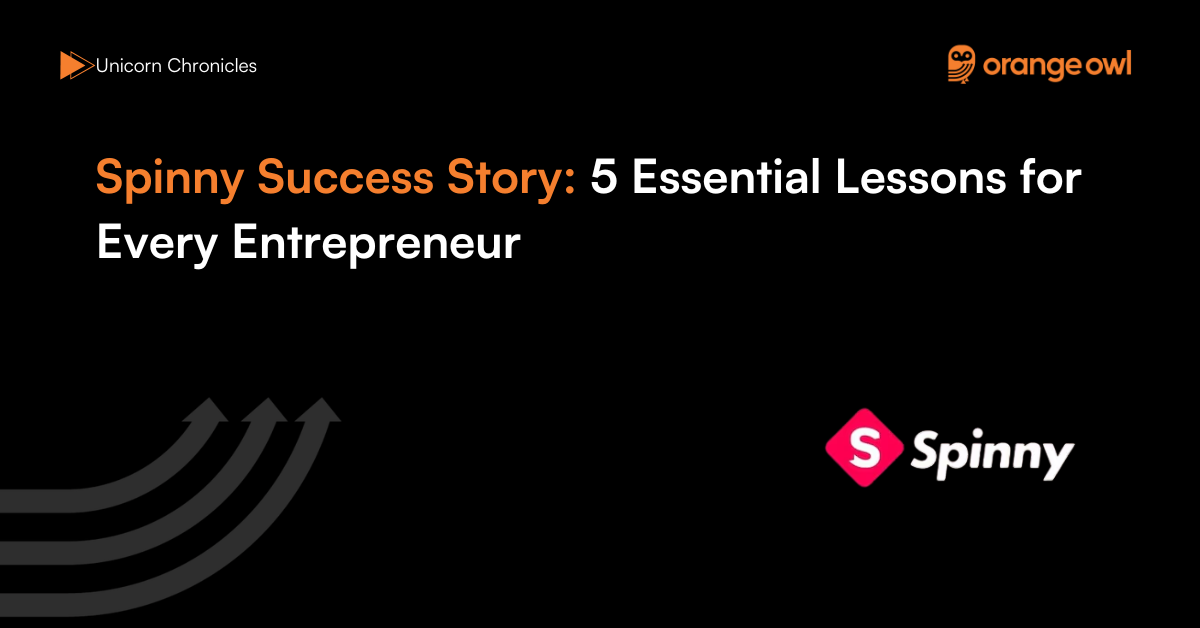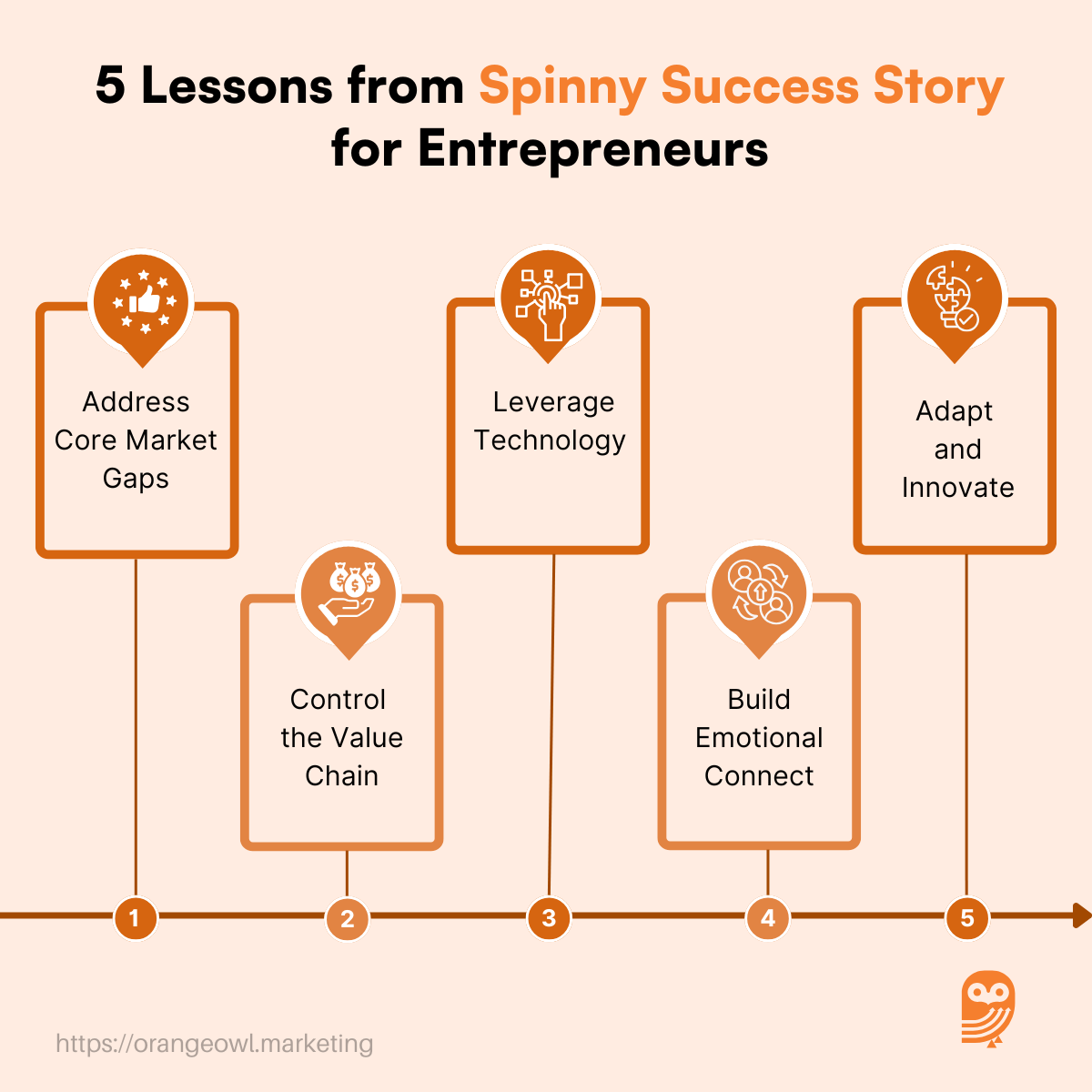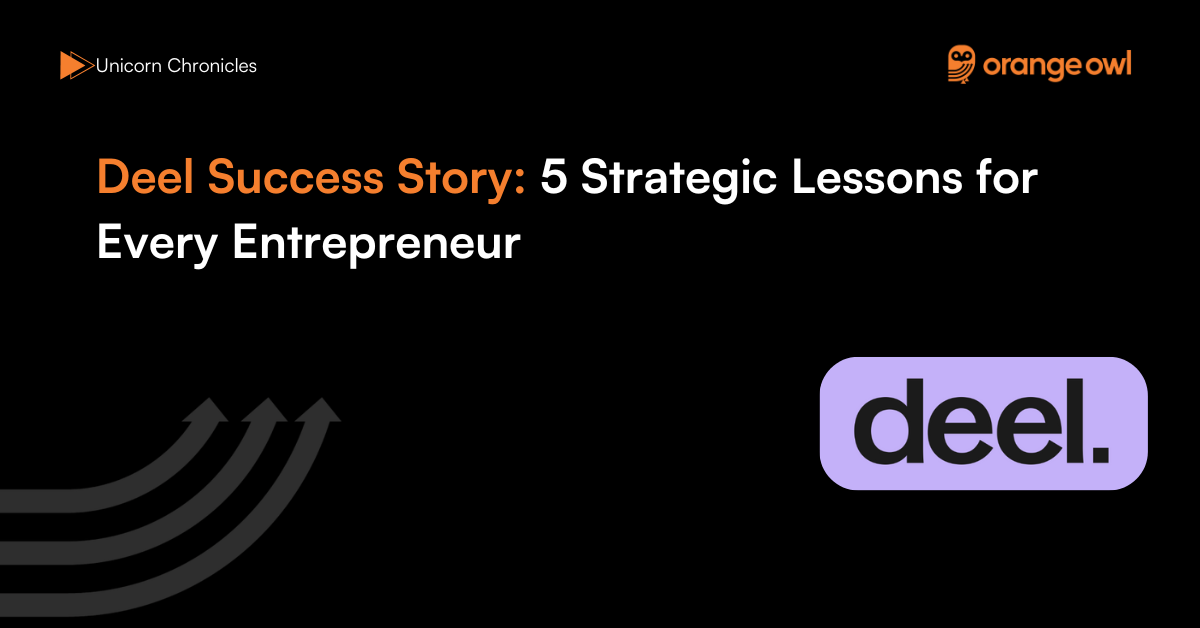Spinny Success Story: 5 Essential Lessons for Every Entrepreneur
Vivek Goel
May 28, 2025

Table of Contents
Introduction
In the evolving landscape of India’s used car market, Spinny has emerged as a beacon of trust, technology, and transparency. Founded in 2015, the startup set out with a clear mission: to simplify and de-stress the process of buying and selling pre-owned cars. What set Spinny apart from the beginning was its determination to address the long-standing pain points that plagued the sector—opaque pricing, inconsistent quality, unreliable dealers, and a general lack of trust.
At a time when the market was dominated by unorganized players and transactional intermediaries, Spinny took a bold bet on full-stack ownership, choosing to control the end-to-end experience. This meant procuring cars, conducting rigorous quality checks, refurbishing them in-house, and selling directly to customers—online and through physical car hubs. This not only ensured a seamless buying journey but also allowed the company to uphold high standards of vehicle quality and after-sales service.
Spinny’s approach resonated particularly well with first-time car buyers, a growing demographic in India’s urban and semi-urban areas. By offering fixed pricing, detailed inspection reports, and no-haggle policies, Spinny earned the trust of a population that was previously hesitant to venture into the second-hand car market.
As of 2024, the Indian used car market is valued at approximately $31.62 billion, with projections suggesting it will more than double to $63.87 billion by 2029, growing at a CAGR of 15.10%. Spinny’s unicorn status and rapid growth are not just a testament to market demand, but also to the company’s sharp execution and long-term thinking.
For entrepreneurs, Spinny’s journey provides a compelling playbook on how to thrive in a traditional, fragmented industry by building a customer-first brand grounded in integrity, innovation, and consistent delivery.
Origin Story
The inception of Spinny is deeply rooted in the personal frustrations of its founders—Niraj Singh, Ramanshu Mahaur, and Mohit Gupta—who experienced firsthand the opaque and unreliable nature of India’s used car market. Buying a pre-owned vehicle in India often involved dealing with shady intermediaries, hidden vehicle histories, and price manipulations. The entire process lacked transparency and made car buying a stressful affair, especially for first-time buyers.
Recognizing this structural inefficiency, the trio decided to build a platform that would place trust and transparency at the core of every transaction. In June 2015, they launched Spinny in Gurugram, with the goal of creating a seamless, technology-enabled platform that gave buyers complete peace of mind. Their vision was to build an ecosystem where users could confidently buy and sell cars with full knowledge of the vehicle’s condition, history, and price.
“We are working to solve pain points like price uncertainty, trust gap, and inconvenience. Spinny would be a go-to platform for people to buy and sell cars with confidence.” –Niraj Singh
It wasn’t just about creating a marketplace—it was about transforming a broken system into one where consumers felt empowered, informed, and respected.
Business Space and Early Challenges
Spinny entered a market that was vast but fragmented. The Indian used car segment has historically been dominated by unorganized players and informal networks, where trust is low and quality assurance is often missing. It was a challenging space, with razor-thin margins, intense competition, and widespread customer skepticism. Spinny’s decision to take the full-stack route—owning every touchpoint from procurement to delivery—was bold and unorthodox for a startup of its size.
Unlike classified marketplaces or listing platforms that merely connected buyers and sellers, Spinny chose to take end-to-end responsibility for the customer experience. This meant buying cars from sellers, thoroughly inspecting and refurbishing them, and then selling them under the Spinny brand with fixed pricing and warranties. While this required significant capital investment, inventory management, and operational rigor, it gave Spinny total control over quality, pricing, and customer satisfaction.
This vertical integration strategy paid off. By eliminating middlemen, Spinny was able to offer competitive pricing, guarantee vehicle quality, and provide a no-haggle, no-stress purchase experience. It also allowed them to introduce consumer-friendly innovations like 7-day returns, 5-day delivery, and 200-point vehicle inspections.
“If you control inventory, you also control product quality.” -Niraj Singh
That insight became the cornerstone of Spinny’s business philosophy. Rather than chasing scale at the expense of service, they chose to build a brand synonymous with trust—one car, one customer, and one experience at a time.
Growth Strategies
Spinny’s remarkable growth has been driven by a series of thoughtful, long-term strategic choices rooted in operational excellence and customer trust. One of the most pivotal decisions was to adopt a full-stack ownership model. Unlike traditional marketplaces, Spinny chose to manage the entire car buying journey—from sourcing vehicles, refurbishing them in-house, listing them on their platform, to handling delivery and post-sale services. This control over every stage allowed the company to deliver a consistently high-quality experience, building a reputation for reliability and transparency in a largely unorganized sector.
Technology has been a backbone of Spinny’s scale-up strategy. The company integrated advanced data analytics and proprietary tech tools across its value chain—optimizing everything from inventory turnover to price discovery and customer touchpoints. These systems helped them fine-tune demand forecasting, reduce operational inefficiencies, and offer a personalized experience to buyers and sellers alike.
Spinny also introduced customer assurance features that set new benchmarks in the used car industry. Their 200-point car inspection, fixed pricing model, 5-day return window, and 12-month warranty were designed to de-risk the buying process for customers. By prioritizing consumer peace of mind over aggressive sales tactics, Spinny managed to convert hesitant buyers into loyal advocates.
This customer-focused model caught the attention of major investors. In December 2021, Spinny raised $283 million in a Series E funding round, propelling its valuation to $1.8 billion and officially marking its entry into the unicorn club. The capital infusion enabled them to strengthen operations, enhance tech capabilities, and expand their presence across the country.
From its humble beginnings in Delhi NCR, Spinny rapidly scaled its footprint, establishing 36 car hubs across 22 cities in India. Each hub functions as a local fulfillment center, ensuring faster delivery, better car availability, and a more localized customer experience. Through this structured and strategic expansion, Spinny positioned itself as a trusted nationwide brand in the used car segment.
Marketing Strategies
While the used car industry may not traditionally lend itself to glamour or emotional resonance, Spinny turned this perception on its head with innovative and emotionally intelligent marketing. At the core of its campaigns was a deep understanding of Indian consumers—where owning a car is not just a purchase but a milestone, a symbol of achievement, and a personal moment of pride. Spinny tapped into this sentiment by crafting emotional branding that celebrated the joy of first-time ownership, long drives, and family memories associated with cars.
A significant leap in brand visibility came when cricket legend Sachin Tendulkar joined Spinny in December 2021 as a strategic investor and brand ambassador. This partnership was more than a celebrity endorsement—it was a statement of credibility and alignment of values. Tendulkar’s reputation for integrity and excellence made him the perfect face for a brand committed to trust and quality. His association significantly boosted Spinny’s recognition and goodwill across India.
Another key pillar of Spinny’s marketing was transparent communication. In an industry plagued by suspicion and misinformation, Spinny focused on building confidence by highlighting its rigorous quality checks, return policies, and customer-first promises. The messaging across their platforms consistently reinforced this commitment to honesty and openness.
Spinny also embraced digital engagement to educate and connect with potential buyers. Through blog content, YouTube videos, customer testimonials, and active social media interactions, the company built a strong online presence. These platforms weren’t just used for promotion—they served as knowledge hubs that demystified used car buying, guided users through financing options, and explained Spinny’s unique service offerings.
Together, these strategies created a well-rounded marketing narrative—one that appealed both emotionally and logically to a wide range of Indian consumers. By balancing tech innovation with human-centered messaging, Spinny successfully transformed its brand from a transactional service to a trustworthy companion in the car-buying journey.
5 Essential Lessons for Every Entrepreneur
1. Address Core Market Gaps
Spinny’s success started with a keen observation of a deep-rooted market inefficiency—the lack of trust and transparency in the used car ecosystem. Buyers were often left to navigate a maze of unreliable sellers, inconsistent pricing, and hidden vehicle issues. Spinny tackled these pain points head-on by redesigning the car-buying experience from the ground up.
By offering fixed pricing, thorough inspections, and verified listings, they eliminated common consumer anxieties. Entrepreneurs must learn to solve foundational problems in their industry to truly create value and stand out from the competition.
2. Control the Value Chain
Instead of taking the easier route of acting as a marketplace, Spinny took full ownership of the entire car transaction journey—from procurement and inspection to sales, delivery, and after-sales service. This vertical integration was challenging but proved to be a key differentiator.
It allowed them to ensure quality, build consumer trust, and optimize operational efficiency. The lesson here is clear: when you control the value chain, you control the customer experience—a crucial edge in sectors where consistency and trust matter most.

3. Leverage Technology
Spinny embedded technology and data analytics at the core of its operations. From AI-powered price benchmarking to digital documentation and real-time inventory tracking, technology streamlined every function.
This not only reduced human error and increased operational speed but also offered actionable insights for continuous improvement. For modern entrepreneurs, tech isn’t just a support function—it’s a strategic enabler. When used smartly, it can power innovation, scale, and sustainable growth.
4. Build Emotional Connect
Spinny recognized that car ownership in India is deeply emotional—often symbolizing independence, achievement, or a new phase in life. Their branding and customer service tapped into these sentiments through storytelling, heartfelt campaigns, and thoughtful experiences.
By doing so, they transformed their brand from a utilitarian service to an emotionally resonant experience. Entrepreneurs should aim to connect with their audience on a human level, turning customers into loyal advocates through empathy-driven strategies.
5. Adapt and Innovate
When the COVID-19 pandemic disrupted consumer behavior and operations, Spinny quickly adapted. They introduced home test drives, contactless deliveries, and stringent hygiene protocols to ensure customer safety without compromising convenience.
These agile innovations not only safeguarded revenue but also reinforced customer trust. This demonstrates that businesses which are quick to pivot and innovate in the face of adversity can turn challenges into opportunities. Entrepreneurs must build cultures that embrace change and prioritize customer-centric problem-solving.
Conclusion
Spinny’s journey from a bootstrapped startup to a billion-dollar unicorn is a compelling blueprint for modern entrepreneurship. At its core, the brand’s rise was not just about selling used cars—it was about redefining how Indians perceive and purchase them. By addressing long-standing industry pain points with authenticity and innovation, Spinny elevated the standards of customer experience in the used car space.
The company’s success highlights the importance of aligning business models with customer needs, using technology to empower rather than replace human touchpoints, and fostering emotional brand loyalty in transactional industries. As Niraj Singh aptly puts it,
“Our mission is to make car buying and selling a delightful experience by bringing transparency and trust to the process.”
For entrepreneurs, Spinny is more than a business case—it’s a masterclass in staying customer-first, thinking long-term, and building a business that people believe in.


